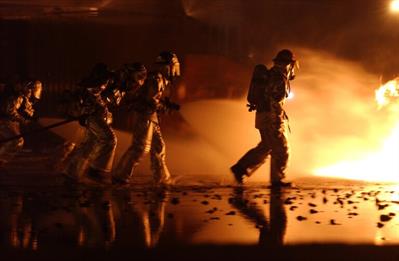Firefighters, EMTs and Paramedics Deserve the Benefit of the Doubt. Illinois Rebuttable Presumptions

Firefighting is one of the most dangerous occupations. As part of their duties, firefighters are exposed to many hazards such as noise, carbon monoxide and other respiratory irritants, which often results in hearing loss and can trigger cardiovascular events, such as sudden heart attacks.
Firefighters are exposed to noise from sirens, alarms, communication devices, pumps, engines, chainsaws and other pneumatic tools. The noise levels from these sources regularly exceed occupational exposure limits, which over time leads to noise induced hearing loss. In addition to hearing loss firefighters are also at risk to develop tinnitus, a constant ringing in the ears.
Numerous studies have also demonstrated strong evidence linking firefighting to cardiac events. Cardiovascular disease is the number one cause of duty-related fatalities among fire fighters. According to a Harvard study the majority of on-duty heart related deaths and cardiac events in firefighters are work related and are precipitated by physical and toxic factors. The study demonstrated a markedly significant increase in likelihood of heart disease events during fire suppression, alarm response and return for alarms; and during rigorous physical training exercises. Moreover, sudden heart attacks and sudden cardiac deaths are 10 to 100 times more likely to occur during fire suppression activities compared to non-emergency situations.
Fortunately, the Illinois legislature recognized the numerous hazards faced by not only firefighters, but also EMTs and paramedics. In 2008 the legislature amended the Illinois Workers’ Compensation Act to the benefit of firefighters, EMT and paramedics. Specifically, the Section 6(f) of the Illinois Workers’ Compensation Act provides that any condition or impairment of health of a firefighter, emergency medical technician, or paramedic that results directly or indirectly from
- blood-borne pathogens,
- lung or respiratory disease or condition,
- heart or vascular disease or condition,
- hypertension,
- tuberculosis,
- cancer,
- hearing loss or
- hernia,
is presumed to arise out of and in the course of their employment. This presumption however, only applies to fire fighters, EMT’s and paramedics who have been on the job for (5) more years.
This is provides a great advantage in litigation for firefighters, EMT’s and paramedics who suffer from any of these listed conditions. Normally, the employee has the burden of proving their condition arose out of and in the course of their employment. Under the rebuttable presumption, the onus is on the employer to prove the condition did not arise from employment. If the employer provides evidence that the condition is not work related, than the burden of proof shifts back to the injured worker. If the employer does not present evidence to rebut this presumption, than the injured worker will be awarded workers’ compensation benefits.
